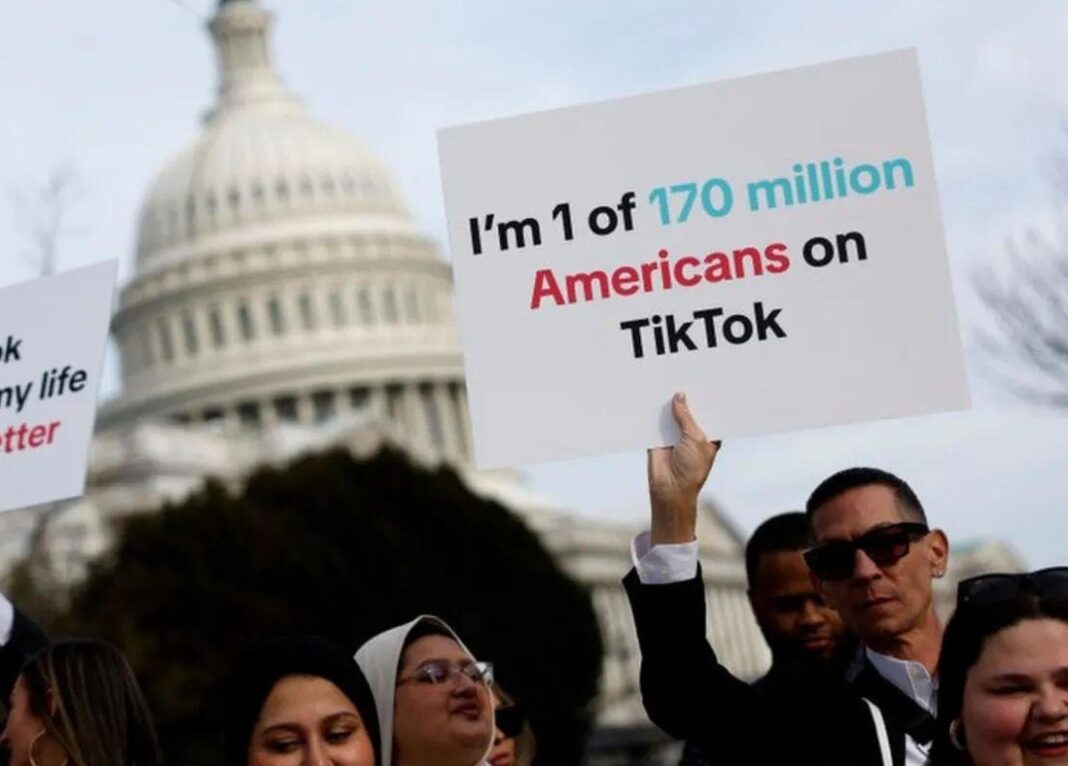BTN News: The possibility of TikTok being banned in the United States has come closer to reality following a significant legislative decision. The U.S. Senate has approved a bill that mandates the Chinese-owned parent company of TikTok, ByteDance, to sell the platform or face a potential ban. This decision has raised serious concerns not only among TikTok’s massive user base in the U.S., estimated at 170 million, but also in the broader tech and social media landscapes. The primary concern driving this legislative action revolves around data security and the potential for the Chinese government to access the sensitive information of U.S. users. Although TikTok has consistently denied sharing user data with the Chinese government, the doubts persist, leading to this drastic move by U.S. lawmakers.
The bipartisan push in Congress underscores the gravity of the concerns regarding TikTok’s ties to China. Legislators argue that the possibility of the Chinese government compelling ByteDance to hand over data poses a significant national security threat. This sentiment was not just confined to this recent legislation; former President Donald Trump had attempted a similar ban in 2020, though his efforts were ultimately unsuccessful. Interestingly, Trump, who is vying for the Republican nomination in the 2024 presidential election, has criticized the current bill, claiming it could unjustly benefit Facebook by limiting competition.
While the bill has passed both the House of Representatives and the Senate, it does not mean that TikTok will be immediately banned once President Joe Biden signs it into law. In fact, it might take several years before the effects are fully realized, as ByteDance has filed a lawsuit to block the forced sale. The legal battle is expected to escalate to the Supreme Court, which could delay any immediate actions. Moreover, the legislation provides ByteDance with a nine-month window to sell TikTok to a U.S.-based company, with an additional three-month grace period, pushing any potential ban into 2025. This timing means that the future of TikTok could be influenced by the results of the 2024 presidential election, especially if Trump were to win and attempt to halt the ban.
The most straightforward method for enforcing a ban would involve removing TikTok from major app stores operated by Apple and Google, effectively preventing new users from downloading the app. Additionally, those who already have TikTok installed would no longer receive updates, potentially exposing them to security vulnerabilities over time. The bill also grants the U.S. president extensive powers to restrict apps linked to countries deemed adversaries, including Russia, China, Iran, and North Korea.
TikTok’s response to this legislative move has been one of strong opposition. The company has criticized the bill, arguing that it violates the principles of free speech in the U.S. and could have severe economic repercussions, including the loss of thousands of American jobs. TikTok’s CEO, Shou Zi Chew, has warned that the bill would disproportionately benefit other social media giants, diminishing competition in the market. Additionally, ByteDance would need to navigate approval from Chinese authorities for any sale of TikTok, a step that Beijing has already vowed to oppose.
The user base of TikTok in the U.S. has also reacted with concern. Many creators who rely on the platform for their livelihoods have voiced their opposition to the potential ban. For instance, Tiffany Yu, a disability rights activist from Los Angeles, emphasized the critical role TikTok plays in her work during a protest at the White House. TikTok has encouraged its American users to contact their political representatives to express their disapproval of the legislation, but this campaign may have backfired. Several lawmakers reported that the influx of calls from TikTok users only reinforced their concerns about the app, solidifying their support for the bill.
The U.S. is not alone in its scrutiny of TikTok. The app has already been banned in several countries, most notably in India, which was one of its largest markets until the government banned it in June 2020. Other nations, including Iran, Nepal, Afghanistan, and Somalia, have also blocked the app. Additionally, the U.K. government and Parliament, as well as the European Commission, have restricted the use of TikTok on work devices, citing security concerns. Even the BBC has advised its staff to remove TikTok from corporate phones.
At the core of TikTok’s success—and the controversy surrounding it—is its highly sophisticated algorithm. This algorithm curates content for users based on their previous interactions, making the platform incredibly engaging but also raising concerns about the extent of data collection. Critics argue that TikTok gathers more user data than other social media platforms, including detailed information about users’ locations, devices, and even their typing patterns. This level of data collection is seen as potentially intrusive and has fueled the fears that underpin the legislative push to either force a sale of TikTok or ban it outright in the U.S.
As the situation unfolds, the future of TikTok in the U.S. hangs in the balance, with significant implications for the global social media landscape. The outcome of this legislative and legal battle could set a precedent for how governments around the world handle the intersection of national security, technology, and global business in the digital age.


